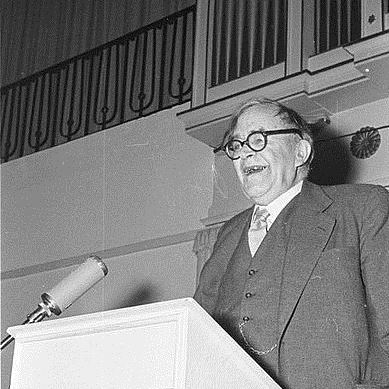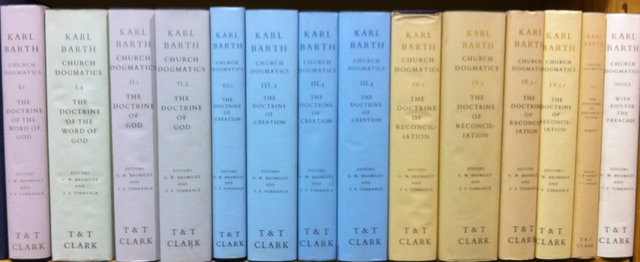| October 15, 2015 |
1 comment
PR: Barth is famous for putting Christ in the center of his theology. Please tell us how radical this idea was for him and how radical it should be for all Christians.
Something powerful happened with Karl Barth tried to listen to and read Scripture as if God himself were speaking to him today from this long-ago text.
I see that I slipped into this question rather nicely at the conclusion of the last question. Some have charged Barth with being “christomonistic,” which basically means he was focused on Christ and only Christ—nothing else in his theology. I have read such charges and frankly they come from people (essentially) in the 1950s and 1960s who did not read (or understand) Barth. There is a difference between having only Christ as the entirety of your theology and having Christ as the centerpiece of the revelation of the Triune God as the basis of your theology! Allow me to point readers to a passage that renders this so well in Barth’s own words. It comes in his
Church Dogmatics II/2 at the very beginning (in the first 2 or 3 pages). Barth will move on to speak of election in II/2, but at this early point he simply is rehearsing what he had done in the previous 3 large volumes (
Dogmatics I/1, I/2, and II/1), which discussed the Word of God, the revelation of the Triune God, the nature of faith and the “abolition” or overcoming of religion, and the doctrine of God itself. He begins this fourth volume (II/2) with the statement that all along in his work readers will note that they have been led to one person—to Christ—with special care. This is because theology must begin at the most vibrant and visible place of God’s revelation to us, namely, in Jesus the Christ. From the first volume, Barth suggests, he has been careful to trace
only what theological truths can arise
out of a focused study of the revelation in Christ. So he says that all along the readers and he have found not some general principle for God and then tried to fill in such a God with our own meaning (as if God were simply
apothesosis, a divinizing, of humans); readers and he have also found all along the way as they traced their center in Jesus Christ not some ethical ideal or some anthropological starting point in order to hear the Word from the God who speaks in his revelation to us. No, we learn about God most clearly through Jesus Christ. That is why, says Barth, we have over and over returned to this One—the Lord—in order to discover who God is and what God is saying to us.
So, Barth has developed a theological methodology based on the revelation in Jesus Christ. What do I mean by this? Barth writes his theology with an intentional doggedness to return everything to Christ, especially in the task of writing theology for the sake of helping the Church. I find such relentless focus on Christ (as the one in whom dwelt the fullness of the Godhead in bodily form) to be refreshing and challenging. It is refreshing because it makes such practical sense to write about God through the lens that God has chosen to reveal himself to us. It is challenging because this is difficult to do with every single doctrine and maintain such clarity and perseverance to this task, as did Barth.

Karl Barth in 1956.
Image: Hans Lachmann / Wikimedia Commons / German Federal Archives.
Not only is this a model for doing theology but I believe it is a faithful model for understanding the heart of God more. As believers who grow into being disciples of Christ, we need desperately this very practical, Christ-the-Center model for our everyday lives as well as for our thinking.
PR: There is a deep suspicion, particularly among conservative Evangelicals and classic Pentecostals, that Karl Barth was a liberal theologian. Is this a valid suspicion?
Terry Cross: First, let me suggest that the phrase “liberal theologian” is not helpful. In some circles, I would be considered liberal because as a Pentecostal I encourage ecumenical dialogue with other churches and denominations. So the term does not help us understand someone and their theology but tends to disenfranchise them. What I mean by this is that it allows us to label them and then never read them!
There is a difference between having only Christ as the entirety of your theology and having Christ as the centerpiece of the revelation of the Triune God.
Second, let me also suggest that if someone’s interpretation of “liberal” does fit Barth (and I’m sure it will for some readers), why do Evangelicals and Pentecostals find that off-putting? I am certain that my own theology is not 100% accurate, as much as I might pray it would be; could I also suggest that other Pentecostals and Evangelicals might not be 100% accurate. Why should we ignore all that someone has written simply because someone else has labelled them “liberal.” In my years of studying theology, I have discovered that I can find really beneficial, thoughtful, reflective material in almost any theologian (although I shall leave two unnamed for whom I had a struggle getting there!).
Tags: barth, cross, featured, influence, interview, karl, terry, theology
Category: In Depth, Summer 2015




